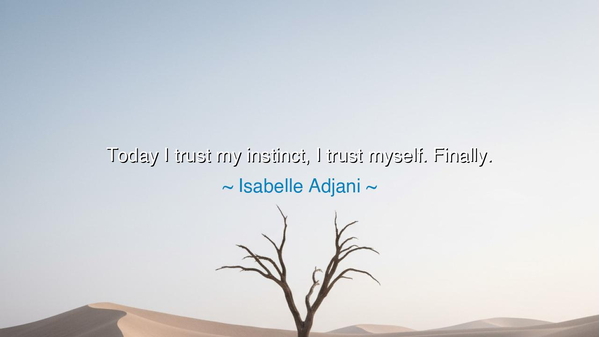
Today I trust my instinct, I trust myself. Finally.






Hear the words of the actress Isabelle Adjani, who proclaimed: “Today I trust my instinct, I trust myself. Finally.” Though simple in form, these words carry the weight of an entire journey of spirit. They are not the naive words of youth, but the hard-won declaration of one who has passed through doubt, through struggle, through the voices of others who sought to shape her life. At last, she emerges with clarity: the greatest power is not external approval, but the courage to trust the voice within.
To trust your instinct is to return to the most ancient wisdom of humankind. Long before books or schools, men and women survived by listening to the quiet signals within: the sense of danger in the dark forest, the intuition of whom to follow, the pull of what path to take. Over time, society taught us to question these instincts, to prefer rules, traditions, and the judgments of others. But Adjani’s cry is a call to return—to recognize that within each soul there lies a compass, and to live fully is to follow it.
Her words echo the struggles of many throughout history. Consider the tale of Joan of Arc, a young girl with no power, no wealth, no title. Yet she trusted the voice within her, the call she believed was divine. Against ridicule, against kings and generals, she followed her instinct to lead France in battle. Though her fate was tragic, her legacy endures, for she dared to trust herself when all others doubted her. Adjani’s declaration—finally—carries the same spirit: it is no small thing to break free of fear and claim one’s own voice.
But why do we wait so long? Because fear and doubt whisper louder than instinct. Society trains us to look outward for guidance: to teachers, leaders, critics, even strangers. We silence our inner voice, convinced that others know better. Only with time, and often through pain, do we learn that the truest guide has been within us all along. Adjani’s “finally” reveals the end of that struggle, the moment when she no longer bends to outside judgment, but stands rooted in her own truth.
O children of tomorrow, learn from this: the one who cannot trust themselves will forever be tossed by the winds of others’ opinions. But the one who dares to stand in their own instinct will find an anchor that no storm can uproot. This does not mean arrogance, nor the refusal to learn, but the strength to weigh advice against the voice within and to walk boldly on the path that feels true.
History shows again and again that those who trusted themselves became the ones who changed the world. From Galileo, who trusted his vision of the stars against the might of the Church, to Rosa Parks, who trusted her conviction enough to remain seated on a bus, it is instinct coupled with courage that gives rise to transformation. Adjani’s words remind us that each of us has the same power—if only we dare to claim it.
Therefore, take this lesson: in your own life, listen for the voice within. When you feel torn, when doubts surround you, quiet yourself and ask, “What feels true to me?” Act upon that truth, even if it trembles, even if others resist. Build the habit of small acts of self-trust, and in time, you will declare, as Adjani did, with pride and peace: “I trust myself. Finally.” For in that moment, you will no longer live borrowed lives, but your own.






PTNguyen Phuong Thao
This quote really hits home because it’s so rare to hear someone express the importance of trusting themselves, especially in a world full of external influences. But how do we come to trust ourselves after years of looking for validation from others? I wonder if Adjani’s confidence came after some kind of transformative experience. Is it a process, or can we simply choose to trust ourselves in the moment? I'd love to hear others' thoughts on how they built that kind of trust in their own lives.
Vvinamilk
It’s interesting how Adjani frames this idea of trusting herself. I often feel like there are moments in life when we all struggle with trusting our own judgment, but her words make me think: Why is it so difficult to believe in ourselves sometimes? Does it stem from past failures or from the expectations of others? What would it take for everyone to experience this kind of clarity and self-assurance that she speaks of?
HVNguyen Hoang Vu
Isabelle Adjani’s statement about trusting her instincts really speaks to the importance of self-empowerment. I’ve always found it difficult to trust myself, especially when there’s external pressure to make decisions that please others. How do we strike a balance between trusting our instincts and considering the perspectives of those around us? Can trusting ourselves completely be a form of self-sufficiency, or does it sometimes leave us isolated from others?
MNNguyen Mai Ngoc
Adjani’s realization of trusting herself is so empowering, yet it makes me question how many of us struggle with self-doubt. What is it that holds us back from trusting our own judgment? Is it the fear of making mistakes or the pressure from others to conform? How do we cultivate that kind of confidence in ourselves? I believe it’s something everyone should experience, but how do we make that leap from doubt to trust?
PTPham Trang
I love the confidence in Adjani's words. Trusting yourself is often one of the hardest things to do, especially after you've been second-guessing your decisions for so long. But does trusting your instincts always lead to the right outcomes? How do we distinguish between genuine intuition and wishful thinking? I think this highlights the fine line between self-assurance and overconfidence—how do we know when we’ve crossed it?